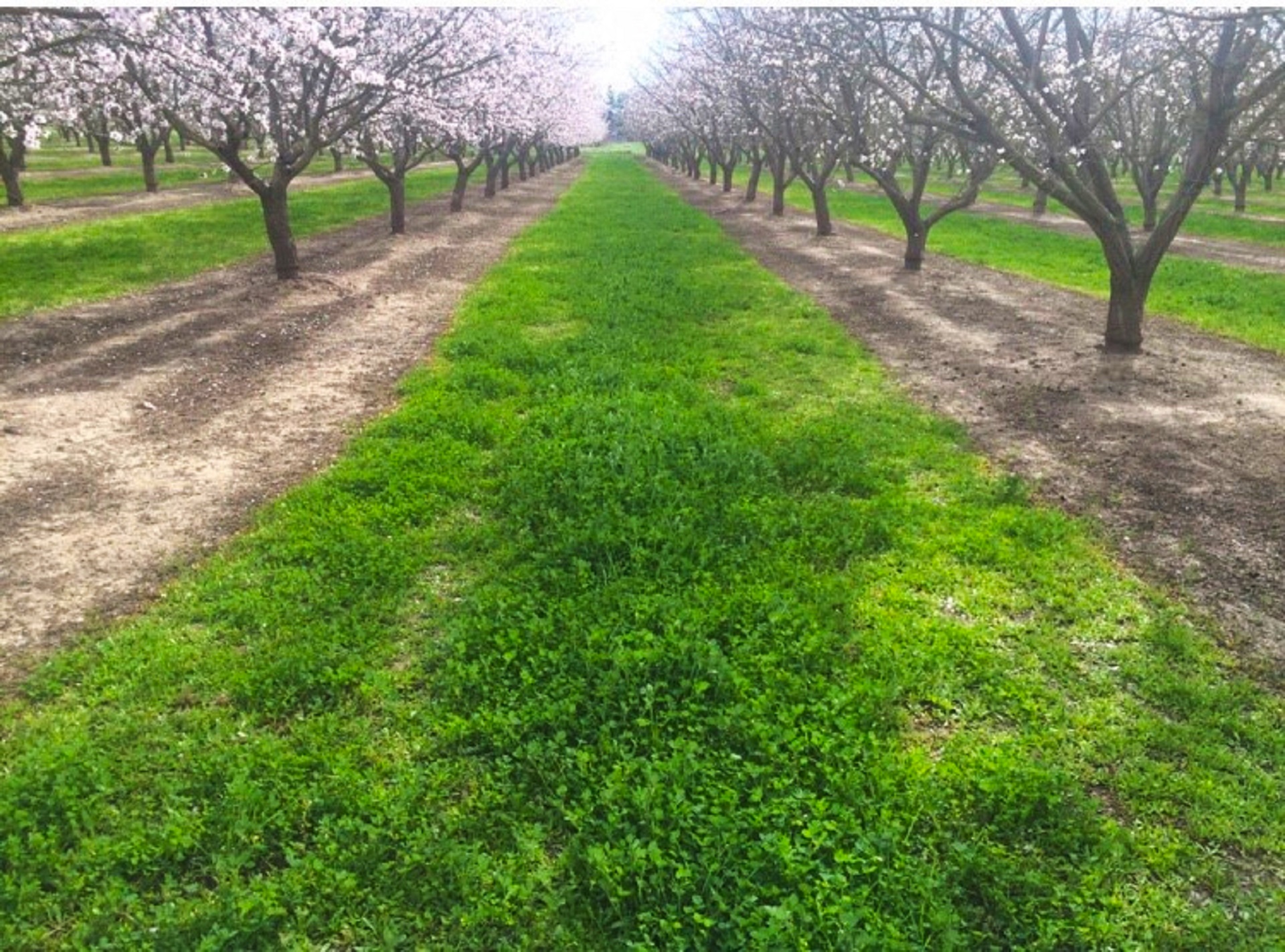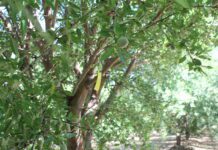
If almond growers are wondering about the economic and environmental benefits of healthy soils farming practices, new evidence shows investment in healthy soil practices has definitely been worthwhile for two almond farms in California’s San Joaquin Valley.
American Farmland Trust (AFT) released eight “Accelerating Soil Health” case studies recently, which document the benefits of soil health growing practices on farm incomes and the environment. For almond production, healthy soils practices include cover cropping, nutrient management (leaf sampling, fertigation and targeted fertilizer applications), mulching the prunings, and compost application. The participating growers for the two California case studies were Ralf Sauter of Okuye Farms in Merced County and Tom Rogers of Madera County. By adopting healthy soils practices and improving soil health, both growers saw economic gains. Sauter improved his bottom line by $657 per acre over a period of 14 years, resulting in a return on investment (ROI) of 198 percent. Tom Rogers experienced a net return of $991 per acre over 10 years for an ROI of 553 percent.

“Our trees are more productive, the soil is healthier, and the orchard is providing environmental benefits like better local air and water quality and lower climate emissions,” Rogers said. “My philosophy is simple: take care of the soil and it will take care of the trees.”
On-farm and university research show that healthy, fully functioning soils offer substantial benefit to California growers, including better soil tilth and water retention, less runoff and soil erosion, improved nutrient storage, and higher soil organic matter levels. As a result, the almond trees are healthier and more productive, while growers see reduced production costs, increased yields, higher profits, and environmental benefits such as carbon sequestration and greenhouse gas reduction.
Growers often hesitate to adopt these soil health methods, because they fear the financial risk of trying something new, especially on leased land. That’s why AFT is using these studies to build a growing library to scale up these soil health practices throughout the state and nation. AFT won a competitive Conservation Innovation Grant from the USDA’s Natural Resources Conservation Service to produce two California almond case studies, four corn-soybean case studies featuring farmers from Illinois and Ohio, and two New York case studies featuring diversified crop farmers. AFT is in the process of disseminating the case studies to growers, agricultural professionals, and the general public to encourage farmers to adopt soil health and climate-smart methods. The evidence is compelling.
Healthy Soils Case Studies
In 2019, California staff from AFT interviewed Sauter and Rogers, both of whom transitioned from conventional farming methods to healthy soils practices over a period of 10 to 14 years, depending on the practice. AFT staff analyzed farm inputs, equipment, and management data, which were entered into an Economic Calculator developed by AFT to run a Partial Budget Analysis (PBA). The PBA for both growers showed decreased production costs and increased net returns as a result of adopting healthy soils practices.
In addition to the Partial Budget Analysis, AFT used USDA’s COMET-Farm tool to determine greenhouse gas reductions and USDA’s Nutrient Tracking Tool (NTT) to quantify water quality benefits such as reductions in nitrogen losses. The almond case studies summarized the results of these climate and water quality analyses.
Rogers’ 175-acre almond orchard showed a 29-percent decrease in greenhouse gas emissions after adoption of these soil health practices.

As seen in Table 1, the left-hand column shows a 10-percent increase in yield over a 10-year period and cost savings for fertilizers, pesticides, and water, made possible over time as soil health improved, allowing for lower input requirements. The right-hand column shows the increase in costs from mulching and compost applications. As a result, after a period of adopting four soil health practices, this grower attained a significant return on investment.
Sauter was an early adopter of soil health farming methods. He told AFT that the increase in yield and environmental benefits at Okuye Farms far outweigh the costs of implementing the practices. Sauter also emphasized the water quality benefits through nutrient management that protects groundwater from nitrate pollution.
“I do all these soil health practices for their economic benefit,” he said. “A lot of people talk about ‘sustainable farming.’ What is that? For me it’s being profitable each year with healthier trees and healthier soils.”
Scaling Up Healthy Soil Growing Practices
This year AFT plans to disseminate the almond case studies to fellow agricultural professionals to encourage them to use the new innovative education and outreach materials with growers who are on the fence about adopting soil health practices. AFT will also train agricultural professionals to conduct their own case studies featuring “soil health successful farmers.”
AFT is interested in finding almond growers in the San Joaquin Valley who have not yet adopted these soil health practices but are curious about them. AFT will conduct a “Predictive Assessment” for such growers to predict potential, future economic benefits from adopting the practices based on the grower’s current farming practices, as well as run the water quality and climate analyses.
For more information about case studies, predictive assessments, or to discuss soil health practices, please contact me at plum@farmland.org, or call 707-480-1893. To read more case studies, visit farmland.org/soilhealthcasestudies.















